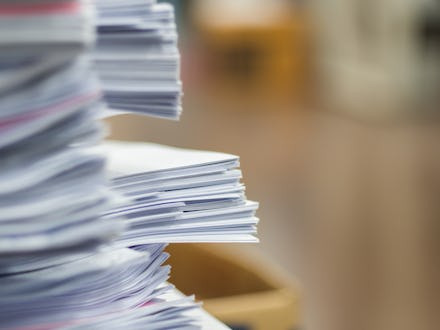Whistleblower complaint alleges White House actively buried Ukraine transcript

The House Intelligence Committee on Thursday morning released the full text of a whistleblower's complaint that has roiled Washington. The document elaborates upon reporting over the last week that President Trump had a troubling phone call with Ukrainian President Volodymyr Zelensky that prompted an intelligence official to file the complaint.
The text of the complaint begins with its author asserting: "In the course of my official duties, I have received information from multiple U.S. government officials that the president of the United States is using the power of his office to solicit interference from a foreign country in the 2020 U.S. election." The complainant goes on to reveal that "more than half a dozen U.S. officials" have shared information related to Trump's apparent effort to solicit interference, and says that both the president's personal lawyer Rudy Giuliani as well as Attorney General William Barr appear to be involved in the matter.
The complaint centers on two issues: Trump's July 25 phone call with Zelensky, and the White House's conduct with regard to Ukraine both before and after that call. In particular, the complaint newly reveals that "senior White House officials intervened to 'lock down' all records" of Trump's discussion with Zelensky, including loading the verbatim transcript of the call "into a separate electronic system" rather than into the system usually used to manage transcripts.
Regarding the phone call itself, the whistleblower reports that "multiple White House officials with direct knowledge of the call" said that Trump used most of the conversation to "advance his personal interests." Primarily, the complaint confirms reporting that Trump "pressured" Zelensky to investigate Vice President Joe Biden and his son Hunter for conduct related to Hunter's work with a Ukranian gas company while the elder Biden was serving in the Obama administration. It also confirms that Trump offered Giuliani and Barr as "his personal envoys on these matters," and that he referred to the two — one a personal employee of Trump's, one a government justice official — "multiple times in tandem."
Further, Trump asked Zelensky to revisit allegations of Russian interference in the 2016 U.S. election, urging Zelensky to "locate and turn over" Democratic National Committee servers that U.S. intelligence officials have determined were hacked by Russia. The whistleblower cited "White House officials" who were "deeply disturbed by what had transpired in the phone call" because they believed "they had witnessed the president abuse his office for personal gain."
Central to the controversy over the Zelensky call — which prompted House Speaker Nancy Pelosi to begin the formal impeachment process against Trump after months of resisting — is the allegation that Trump had used routine aid money to Ukraine as leverage to pressure Zelensky into investigating those matters. Days before his call with Zelensky, Trump reportedly requested that nearly $400 million destined for Ukraine be withheld.
Trump has confirmed that he delayed disbursing the funds, which have been provided to Ukraine annually since the 2014 invasion of Crimea, but he has argued doing so because European countries don't pay enough to Ukraine. Per the whistleblower's complaint, the Ukrainian government readout of the July 25 call included a note that Trump wanted Ukraine to "complete the investigation of corruption cases that have held back cooperation between" the two countries.
The White House released a summary transcript of the call Wednesday, which reflects much of what was alleged in the whistleblower complaint. Trump said he authorized the release because it would prove that his discussion with Zelensky was "very friendly and totally appropriate," though the disclosure had the opposite effect.
Additionally, the whistleblower's complaint reveals that the release was a reconstructed transcript rather than a verbatim one because White House officials blocked a more thorough record from being kept and distributed. Senior White House officials moved to "'lock down' all records" of the call, the whistleblower wrote, "especially the official word-for-word transcript."
Instead of uploading the electronic transcript to the routine computer system used for transcript coordination, White House officials loaded the document onto a separate system typically reserved for "especially sensitive" or classified information. "One White House official described this act as an abuse" of the system, per the complaint.
The document further reveals that this obfuscation of the Zelensky transcript was "not the first time" the Trump administration had moved to place a transcript into the separate computer system "solely for the purpose of protecting politically sensitive — rather than national security sensitive — information."
The complaint additionally details several actions on the part of Giuliani to meet with Ukrainian officials, as well as actions taken apparently at the president's behest (like Vice President Mike Pence skipping Zelensky's May inauguration) that were understood in part to be related to whether Zelensky chose to investigate Biden and the other matters. It also says that instructions to suspend aid to Ukraine in the days before the Zelensky call "had come directly from the president."
The whistleblower makes clear that he "was not a direct witness to most of the events described." Even so, he writes that he found his colleagues' accounts to be "credible" because they described many of the same events and facts in the same matter; some of the information included also was in line with public reporting.
Acting Director of National Intelligence Joseph Maguire testified before the House Intelligence Committee on Thursday morning to discuss the handling of the whistleblower complaint, including why the complaint was not disclosed to Congress within seven days despite it being deemed "urgent" and credible by the intelligence community inspector general.
Maguire said repeatedly that he believed the whistleblower "did the right thing" and was "operating in good faith," though he said he did not know the official's identity. Under questioning from lawmakers from both sides of the aisle, he repeated one more answer: that the situation currently unfolding is "unprecedented."